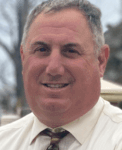COURT HOUSE – A criminal court judge said he will consider the arguments of both parties further before ruling on whether a second state grand jury indictment naming former Wildwood Mayor and Commissioner-elect Ernie Troiano Jr. should be thrown out.
The state accused Troiano of illegally accepting health benefits while serving as Wildwood’s mayor from 2011 through 2019. The state claims he was not entitled to the benefits under law because he was not a full-time employee in his elected position as mayor.
But in Cape May County Superior Court Friday, Nov. 17, a lawyer for Troiano asked the judge to dismiss the indictment, arguing in part that the state failed to present exculpatory evidence to the second grand jury panel to indict him.
The case, which was brought in June 2022, includes then-Mayor Pete Byron and Commissioner Steve Mikulski as co-defendants. However, Troiano was the only one to bring a motion to dismiss.
In March, a state grand jury indicted Troiano, Byron and Mikulski on second-degree official misconduct, second-degree theft by unlawful taking, third-degree tampering with public records and fourth-degree falsifying or tampering with records counts.
But in June, Troiano’s lawyer, Brian Pelloni, convinced Presiding Judge Bernard E. DeLury Jr. to throw the indictment out, based on a procedural mishap during the state’s grand jury presentation.

Because Byron and Mikulski were also named as part of the same indictment, the dismissal order affected their cases as well, since the grounds to dismiss were related to procedure, not evidence. However, since DeLury’s decision to dismiss the indictment was based on a procedural misstep, the order was without prejudice, meaning the case could be brought again.
Prosecutors presented the case to the first grand jury panel during two sessions, and not all jurors were present for both. Those who were not present for the first session were given a transcript of witness testimony they missed, raising issues with their ability to determine credibility. That, DeLury ruled, was against procedural rules and was the fatal flaw in the first indictment.
Troiano’s Argument
On July 31, a second grand jury panel reindicted the three men on the same charges. In arguing to dismiss the case for the second time, Pelloni focused on the person he said is the state’s “key witness,” Susan Maxwell. Maxwell served as a confidential aide during Troiano’s time in office and remains in that role, serving the current commissioners.
“There is only one witness, that the state has acknowledged in their filing, that has direct knowledge of the hours that my client worked, because nobody kept track for years and years at the City of Wildwood. The only one that did was Susan Maxwell,” Pelloni argued.
“She gave a statement to the state prior to the first presentation to the grand jury. We provided them with her statement that said explicitly, in no uncertain terms, of all of the defendants in the case, Mr. Troiano, mayor at the time, worked 35 hours a week at least. At least. No question in her mind whatsoever.”
Pelloni said the law is clear that any elected official who works at least 35 hours is entitled to benefits. When Maxwell testified during the first grand jury proceeding, she was never asked if Troiano worked 35 hours or more, according to the attorney.
“When she got close to testifying to that, the state steered her in another direction. At the second grand jury proceeding, they read portions of her testimony, not the entire testimony … and never presented the statement that she gave regarding 35 hours,” Pelloni told the judge.
Failing to call Maxwell or read her statement regarding Troiano’s hours worked was “an intentional omission of exculpatory information” and therefore grounds for dismissal, the attorney argued.
Troiano did not respond to a reporter’s request for comment following the proceedings. Pelloni also did not respond to an inquiry and has said previously he has a policy not to speak to reporters during an ongoing case.
The State’s Argument
In grand jury proceedings there is no defense counsel or judge present. Prosecutors run the show and may present the case in the way they see fit. If an indictment is handed up, a transcript of the procedure is made available to the defendant, who may then challenge the process in the manner Troiano has.
Deputy Attorney General Brian Uzdavinis, arguing the case for the state, pointed out that grand juries are not there to determine innocence or guilt, but rather make a determination based on first impression, accepting what the state says is correct until proved otherwise.
“The defendant appears to simply misconstrue, or instead seeks to just take control of, the grand jury process, without any legal basis, mind you. His brief takes issue with what evidence the state decided to present, not to present; what witnesses the state decided to call, or not to call; what prior testimony it decided to use, or not to use, and how it decided to use it if it did use it. All of which is well within the state’s discretion, determining how to organize or structure its case in a concise, coherent manner to present the grand jurors,” the deputy attorney general argued.

Uzdavinis told the judge that evidentiary rules are relaxed during grand jury proceedings and hearsay is allowed. Having to call every witness to testify would be “absurd,” he argued. Redactions to transcripts of testimony from the first proceeding were proper because they were done to avoid redundancy and focus on what was relevant.
“The method and manner of the state’s presentation of this case to the grand jury is the state’s prerogative. It’s the state’s call, not the defendant’s,” Uzdavinis told the judge. “There was no clearly exculpatory evidence that directly negated the defendant’s guilt here.”
Uzdavinis also objected to the defense characterizing Maxwell as the “key witness.”
“Susan Maxwell is by far not the state’s key witness in this case. The state has an array of city official witnesses, all of whom spoke relatively uniformly to one another in describing these city elected positions as part-time jobs, because they only involve part-time hours,” the deputy attorney general argued.
Uzdavinis has said he is not authorized to speak to reporters. A spokesperson for the state Attorney General’s Office asked the Herald for written questions that he would try to get answered, but did not respond prior to publication.
DeLury said he would issue a decision in writing on or before Friday, Dec. 8, and relisted the case for a status conference in January, if necessary. Byron and Mikulski are also set to return to court in January.
Contact the author, Shay Roddy, at sroddy@cmcherald.com or 609-886-8600, ext. 142.








